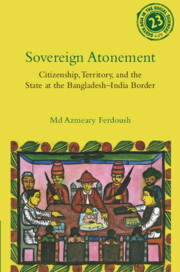Book contents
- Frontmatter
- Contents
- List of figures
- Preface
- Acknowledgments
- Introduction: Remnants, nations, and the sovereign
- 1 Sovereign atonement
- 2 From “sensitive” to “symbolic” spaces
- 3 Land and citizenship as technologies of territory
- 4 Everyday governance: Ambiguity, accountability, and abundance
- 5 Infrastructure, belonging, and the state
- 6 Refusal and tolerance
- Epilogue
- Appendix: A note on methods
- References
- Index
Epilogue
Published online by Cambridge University Press: 30 April 2024
- Frontmatter
- Contents
- List of figures
- Preface
- Acknowledgments
- Introduction: Remnants, nations, and the sovereign
- 1 Sovereign atonement
- 2 From “sensitive” to “symbolic” spaces
- 3 Land and citizenship as technologies of territory
- 4 Everyday governance: Ambiguity, accountability, and abundance
- 5 Infrastructure, belonging, and the state
- 6 Refusal and tolerance
- Epilogue
- Appendix: A note on methods
- References
- Index
Summary
As a phrase, sovereign atonement brings two concepts – “sovereign” and “atonement” – together, which is perhaps not the first combination that comes to mind when we think of them individually, not least because they are rarely discussed on the same page due to their treatment predominantly by two distinct domains of knowledge: politics and theology. However, the idea of the sovereign is primarily discussed in close relation to power and violence, in sharp contrast with an image of an apologetic and amending body atoning for its past deeds. It is therefore unsurprising that the phrase appears unorthodox or even “weird” on first reading. Nonetheless, throughout the book, I have demonstrated that atonement can be used productively in relation to the sovereign to further unlock the everyday state, power, territory, governance, violence, citizenship, and belonging in novel ways. It does so not just by offering a lens through which to examine these issues more deeply but also by providing a foundation on which they are cross-examined against each other. In this epilogue, I undertake precisely this task: teasing out how sovereign atonement, both as a lens and as a framework, coherently binds the book through an inquiry into the issues that have been discussed in their specificity across the chapters in thick ethnographic detail. In doing so, I start by taking a step back. First, I discuss the meaning of the “sovereign” the book has used. I then shed light on the nature of “atonement” to clarify precisely in what sense I have used the term throughout. Finally, I delve into a discussion of how the merging of these two concepts – that is, sovereign atonement – pans out across the book.
Sovereignty's meaning has been discussed in a range of ways and contexts. Yet Stephen Krasner identifies four major applications of the term (Krasner, 1999). These are international legal sovereignty, Westphalian sovereignty, domestic sovereignty, and interdependence sovereignty. According to Krasner, international legal sovereignty refers to the practices that allow one territorial entity to recognize another through formal juridical independence. Westphalian sovereignty is generally used to describe a political organization of territories based on the inclusion and exclusion of actors who have the power to exercise authority within the territory in question.
- Type
- Chapter
- Information
- Sovereign AtonementCitizenship, Territory, and the State at the Bangladesh-India Border, pp. 162 - 167Publisher: Cambridge University PressPrint publication year: 2024

